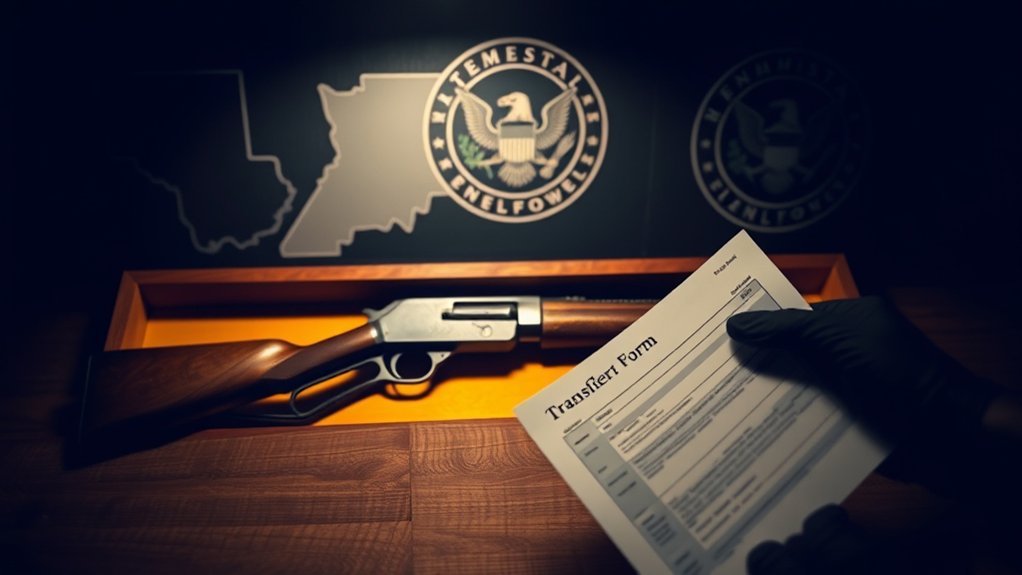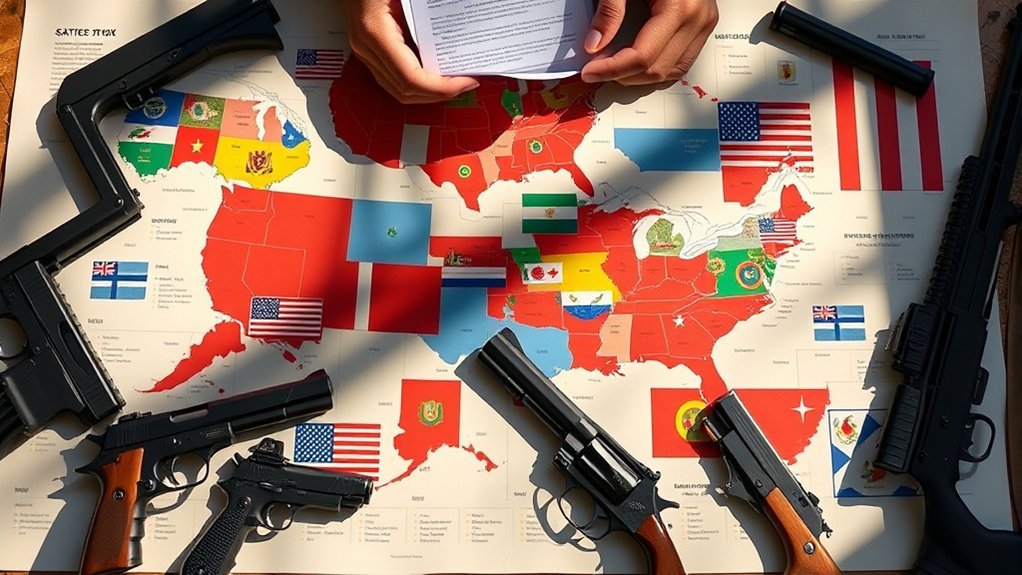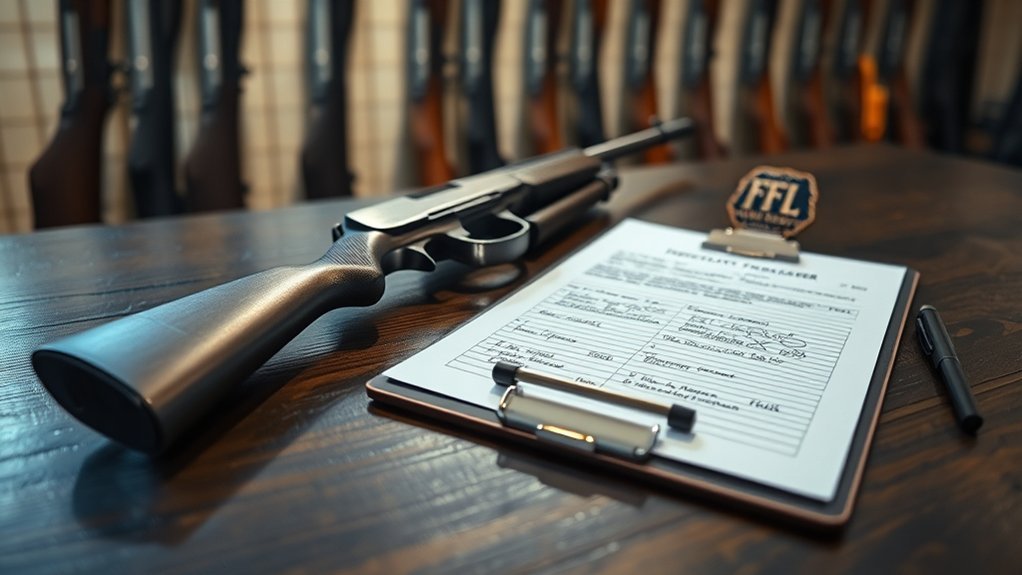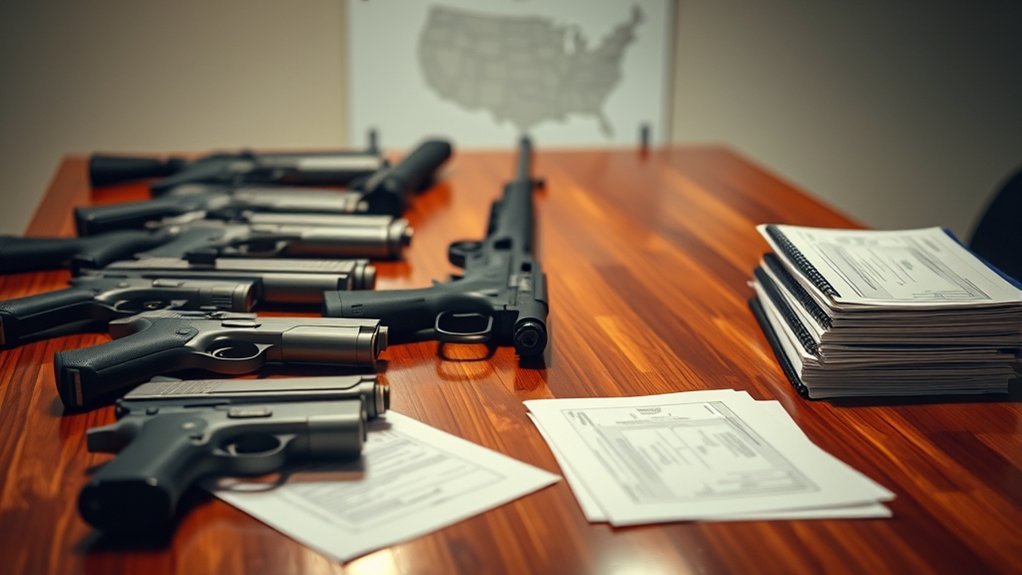It’s interesting how many people unknowingly violate firearm transfer laws when moving between states. Understanding the complexities of interstate firearm transfers is vital, especially with the varying federal and state regulations in place. The role of Federal Firearm License (FFL) dealers and the necessary paperwork can be complicated. What happens when someone fails to comply with these laws? The consequences can be severe, making it essential to grasp these rules thoroughly.
Understanding Federal Laws on Firearm Transfers

When you engage in interstate firearm transfers, it’s vital to understand the federal laws governing these transactions, as they set the foundation for compliance. The Gun Control Act of 1968 regulates these transfers, requiring that firearms be transferred through a Federal Firearms Licensee (FFL). You’ll need to guarantee that both the buyer and seller adhere to this requirement. Additionally, the Bureau of Alcohol, Tobacco, Firearms and Explosives (ATF) enforces regulations regarding background checks, which are mandatory for purchases from an FFL. It’s important to be aware of the limitations on specific firearm types and the associated documentation requirements. Understanding these laws not only protects you legally but also promotes responsible firearm ownership across state lines.
State-Specific Regulations and Variations

When transferring firearms across state lines, you need to be aware of the differences in the transfer process that each state mandates. Some states impose specific registration and licensing requirements that can complicate the transaction. Understanding these variations is essential to guarantee compliance with both state and federal laws.
Transfer Process Differences
While understanding the transfer process for firearms across state lines, you must recognize that regulations vary considerably from one state to another. Each state has its own laws governing who can transfer firearms, the necessary documentation, and the methods allowed for such transfers. For instance, some states require background checks for all private sales, while others may not. Additionally, certain states impose waiting periods or restrict specific types of firearms entirely. It’s essential to research both the originating and receiving states’ regulations to guarantee compliance. Ignoring these differences can lead to legal complications. Always consult state-specific resources or legal counsel to navigate these complexities effectively and guarantee a smooth transfer process.
Registration and Licensing Requirements
Steering through the maze of registration and licensing requirements for firearms can be intimidating due to significant variations among states. Each state sets its own criteria, impacting how you must register your firearm or obtain a license. For instance, some states require registration for all firearms, while others may only mandate it for handguns. Licensing may involve background checks, safety training, or waiting periods, with specific forms to complete. Additionally, reciprocity agreements between states can influence your ability to carry a firearm across state lines. To guarantee compliance, it’s essential to research your state’s regulations thoroughly and stay updated, as laws can change frequently. Understanding these nuances will help you navigate the complexities of firearm ownership effectively.
The Role of Federal Firearm License (FFL) Dealers

Federal Firearm License (FFL) dealers play an essential role in the process of interstate firearm transfers. They serve as intermediaries, guaranteeing compliance with federal and state regulations. When you transfer a firearm across state lines, it’s often necessary to go through an FFL dealer to facilitate the transaction legally. These dealers verify the identity and background of the buyer, helping to prevent illegal sales. They also maintain accurate records of transactions, which is vital for law enforcement and regulatory agencies. By utilizing an FFL dealer, you guarantee that the transfer follows the proper legal channels, reducing the risk of penalties or legal complications. Ultimately, FFL dealers help create a structured environment for safe and lawful firearm transactions.
Necessary Paperwork for Interstate Transfers
When you engage in interstate firearm transfers, you’ll need to complete specific paperwork to guarantee compliance with legal requirements. First, obtain a copy of the Federal Firearms License (FFL) from your dealer, as they’ll facilitate the transfer. You must also fill out the ATF Form 4473, which records firearm purchaser information. This form is vital for tracking the transaction and making sure it adheres to federal regulations. Additionally, some states may require their own specific forms or permits, so it’s important to check local laws. Documenting the transfer properly not only guarantees compliance but also protects both parties in case of future legal inquiries. Always keep copies of completed paperwork for your records.
Background Check Requirements
When engaging in interstate firearm transfers, you must understand the background check requirements that govern these transactions. Federal regulations establish a baseline, but state-specific variations can create additional complexities. It’s essential to familiarize yourself with both to guarantee compliance and avoid legal issues.
Federal Regulations Overview
While understanding the complexities of interstate firearm transfers, it is vital to recognize the background check requirements mandated by federal regulations. The Brady Handgun Violence Prevention Act requires licensed dealers to conduct background checks on potential buyers before completing a sale. This process involves checking the National Instant Criminal Background Check System (NICS) to guarantee the individual isn’t prohibited from owning a firearm. If you’re transferring firearms between states, both the seller and buyer must comply with this requirement, even if the transaction occurs between private individuals. Keep in mind, failing to adhere to these regulations can result in significant legal consequences. As a result, it is important to understand these federal mandates before engaging in any interstate firearm transfer.
State-Specific Variations
State-specific variations in background check requirements can greatly impact interstate firearm transfers, so it’s crucial to be aware of these differences. Some states mandate background checks for all firearm sales, while others exempt private transactions from such requirements. If you’re transferring a firearm across state lines, you must understand both your home state’s laws and the laws of the receiving state. For instance, California requires universal background checks, whereas Texas has more lenient regulations. Failing to comply with these specific requirements could lead to legal consequences. Always verify you’re informed about the necessary procedures, as they can vary considerably and affect your ability to conduct a legal and safe transfer. Stay updated, as laws can change frequently.
Shipping Firearms Across State Lines
Shipping firearms across state lines involves maneuvering a complex web of federal and state regulations that can vary considerably. To guarantee compliance, you need to understand the key players involved in firearm transfers.
| Regulation Type | Federal Law | State Law Variation |
|---|---|---|
| Background Checks | Required for licensed dealers | Varies by state |
| Transfer Documentation | Must maintain records | May require additional paperwork |
| Shipping Methods | Restricted to specific carriers | Additional state restrictions |
| Prohibited Firearms | Defined by federal law | States may have stricter definitions |
Before initiating a transfer, always verify both federal and state laws. Ignoring these regulations can lead to severe legal repercussions. Stay informed and proceed carefully.
Exceptions to Standard Transfer Rules
Although standard transfer rules govern most interstate firearm transactions, several exceptions exist that can greatly alter the process. For instance, licensed dealers can facilitate interstate transfers without adhering to all standard requirements. In addition, certain familial transfers—like gifting firearms to immediate relatives—may bypass typical regulations, depending on state laws. Military personnel often enjoy exemptions, allowing them to transfer firearms more freely across state lines while on duty. Moreover, some states have specific laws that exempt certain types of firearms, such as antique or curio firearms, from standard transfer rules. Understanding these exceptions is essential for complying with both federal and state laws, ensuring you navigate the complexities of interstate firearm transfers effectively.
Consequences of Non-Compliance With Firearm Laws
Failing to comply with firearm laws can lead to serious legal repercussions. You risk facing criminal charges, which may include fines, imprisonment, or both, depending on the severity of the violation. Additionally, a conviction can result in the loss of your right to possess firearms in the future. Regulatory agencies may also impose civil penalties, affecting your ability to engage in legal firearm transactions. Non-compliance can damage your reputation and limit your opportunities in firearm ownership or related activities. It’s essential to understand and adhere to local, state, and federal laws regarding firearm transfers to protect your rights and avoid these potential consequences. Always stay informed about legal requirements to guarantee compliance.
Conclusion
In summary, maneuvering interstate firearm transfers can feel like traversing a legal labyrinth, with twists and turns around every corner. But don’t let the complexities intimidate you! By understanding federal and state regulations, and working with an FFL, you can guarantee your transfer is as smooth as butter sliding down a hot skillet. Remember, compliance isn’t just essential—it’s your golden ticket to responsible firearm ownership. So gear up, stay informed, and enjoy the ride!

